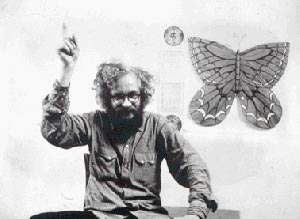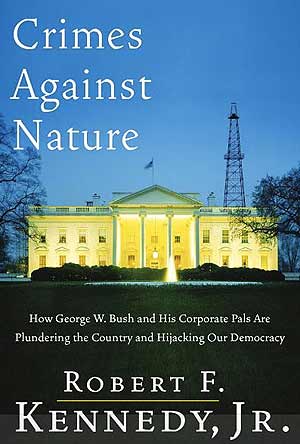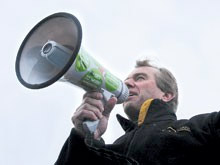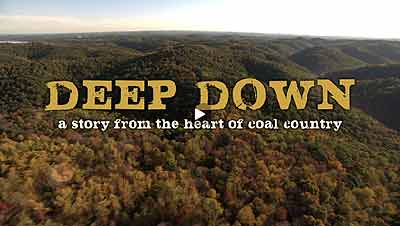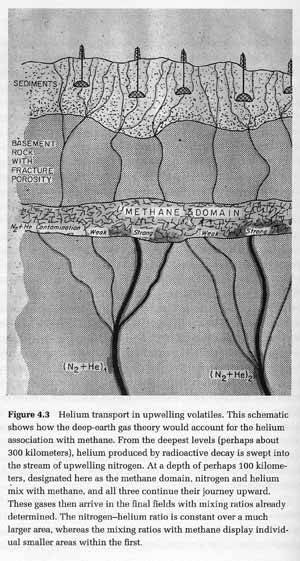Biblio
CNX Gas - (a CONSOL Energy subsidary), is the largest producer of natural gas in the Appalachian Basin.
A world record was set by CNX Gas for drilling the most cumulative feet with a single drill bit.
CONSOL Energy purchased the naming rights to the new arena for the Pittsburgh (Pa.) Penguins. CONSOL Energy Center is expected to open its doors in 2010.
On March 15, 2010, CONSOL announced the purchase of Dominion’s Exploration and Production business for $3.475 billion.
According to CONSOL, Dominion Exploration and Production is known as “one of the oldest and most active drillers in Pennsylvania and West Virginia”.
The transaction includes 1.46 million acres for oil and gas drilling with over 9,000 already-producing wells.
Sourcewatch notes that this transaction includes 491,000 acres of land in the Marcellus shale formation of Pennsylvania and West Virginia, and almost triples the amount of land rights CONSOL owns in the Marcellus area.
According to CONSOL’s press release, this purchase will make the company the largest producer of natural gas in the Appalachian basin and give CONSOL “a leading position” in the Marcellus area.
Note: The following articles are summaries only:
See: Consol To Pay $1.4M To End Coal Mining Pollution Suit
See: Va. Landowners Sue Consol Over Coalbed Methane
Europe's dash for gas is leading Halliburton, Chevron and Exxon to consider bringing hydraulic fracturing across the Atlantic.
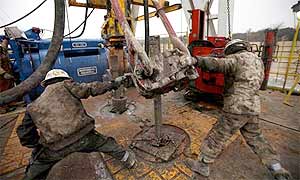
Workers at the Barnett Shale field of Fort Worth, Texas, where hydraulic fracturing technology is needed to release underground gas. Photograph: Robert Nickelsberg/Getty Images
Despite growing evidence from the US of a raft of negative environmental and social consequences of drilling for natural gas using the controversial hydraulic fracturing process, European energy companies are scrambling to secure licenses to roll out extraction projects this side of the Atlantic.
...Experts have increasingly expressed concern that the chemicals used in fracking may pose a threat underground or when waste fluids are transported or spilled.
...'Construction of pipelines could cause problems, but so could the construction of roads,' adds Kassenberg. 'If roads are built to transport water and gas then it will open up pristine countryside to mass tourism, and could bring an additional negative impact to the environment.'
See: France to Unlock Dirty Oil Under Paris With Texan Help
I attended the Energy Conference 3/31 - 4/2/2011.
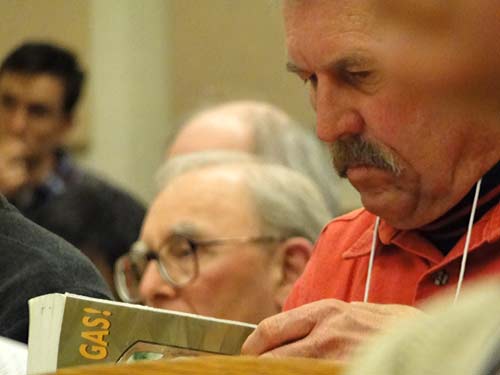
Getting serious about natural gas at the 2011 Cornell Energy Conference.
Photo by Neil Zusman.
See: Cornell University Law School - 2011 Energy Conference
First posted the photographs on 4/8 and liked how it played against Dylan and the Dead (1989) "All Along the Watchtower", but copyrights... I couldn't use Dylan and the Dead on YouTube- rock it Google.
But now I think the ballads about John Henry resonate for me - the classic man against machine tale, and I think that this conference was about that and more (mechanical, chemical). It needs a ballad. Sort of like the one about digging a tunnel for the railroad...but more about the one in progress, digging for the truth. The music is from the great Anthology of American Music. Vol. 2. (Neil Zusman, 2011-04-19).
“John Hardy” stands right next to “John Henry” as one of the most popular “figures” in the folk song tradition. (In the Anthology too, they are next to each other). In fact, many people combined the two songs and many scholars confused the two characters as Alan Lomax once said. Both were black railroad workers but their story is quite different.
The historical John Hardy killed a man during a crap game and was hanged for his crime. Before his execution he wanted to make peace with God so they sent a preacher and went to the river to baptise him. On the scaffold he claimed his repentance for his crime and probably sang some verses that would be included in the ballad that bore his name.
Harry Smith, ed. Anthology of American Music. Vol. 2. Smithsonian Folkways Recordings. 1997. "The Williamson Brothers & Curry: Gonna Die With My Hammer in My Hand".; "The Carter Family: John Hardy Was a Desperate Little Man."
Steel-drivin' men like John Henry used large hammers and stakes to pound holes into the rock, which were then filled with explosives that would blast a cavity deeper and deeper into the mountain. In the folk ballads, the central event took place under such conditions.
Eager to reduce costs and speed up progress, some tunnel engineers were using steam drills to power their way into the rock. According to some accounts, on hearing of the machine, John Henry challenged the steam drill to a contest. He won, but died of exhaustion, his life cut short by his own superhuman effort.
Carlene Hempel, Deb Procopio, Dan Shaver, Beth Novak. John Henry The Steel Driving Man. Electronic Resource. Accessed 2011-04-19.
Discover this great Anthology of American Folk Music by Harry Smith here and an even more amazing resource exploring it:
Gadaya. The Old Weird America. "Gonna Die with a Hammer in my Hand." Electronic Resource. Accessed 2011-04-19.
See: Congress Launches Investigation Into Gas Drilling Practices
Cornell University Cooperative Extension. Landowner Information. Links to Landowner Coalitions, Key Points for Property Owners, Gas Rights and Right-of-Way Leasing Considerations for Farms. Woodlands, and more.
See also: Cornell Cooperative Extension (CCE): Natural Gas Resource Center
Special Community Forum:
Thursday, March 31, Friday, April 1, Saturday, April 2, 2011.
Cornell Law School | Free Admission
Natural gas drilling using hydraulic fracturing ("hydrofracking") may be poised to begin in Upstate New York.
...This heated issue is part of the larger state, national, and international energy picture. The conference will use natural gas drilling as a lens to explore energy policy, the global energy market, and the integral role the law can and must play in creating energy security and ensuring a sustainable future.
...The conference will explore, among other topics, the legal issues associated with natural gas drilling and energy policy, different scientific perspectives on how clean and sustainable natural gas is, alternative clean energy sources, and the potential risks and benefits of shale gas development in Upstate New York.
PLEASE NOTE: Seating is limited at most panels, and registration is first-come, first-served. Registrants not seated in the amphitheater where the panel is taking place will be seated in an adjacent amphitheater where the panel will be broadcast live via simulcast. Contact Ben Tettlebaum, bwt32@cornell.edu, with questions or concerns.
If you are predisposed to distrust big business and the bureaucrats who regulate it, then “Gasland,” a soberly muckracking film about the health and environmental dangers of the current nationwide rush to drill for natural gas, will light a flame in you...
The accumulation of stories and sympathetic faces is persuasive; it’s buttressed by testimony from scientists like Theo Colborn and Al Armendariz, named regional director of the Environmental Protection Agency in Dallas since the film was completed. Most viewers who seek out “Gasland” are likely to share Mr. Fox’s outrage (which he expresses in melancholy tones) and to accept the picture, familiar and so often true, of heedless profiteering, co-opted and ineffective regulation, Orwellian spin control and innocent, ruined lives. Comparisons to the oil spill in the Gulf of Mexico will be unavoidable...
Mr. Fox shows a general preference for vivid images — bright red Halliburton trucks, beeping but unidentified scientific instruments — over the more mundane crossing the t’s and dotting the i’s of investigative journalism...
Mr. Fox closes with an ominous warning about the threat fracking poses to New York City’s watershed. New Yorkers who are frightened at the prospect will want to know that the state recently tightened regulations governing drilling in that area, at least temporarily.
Covalent has been drilling near Cooperstown, NY. In 2008, it tried to purchase water from the Village of Cooperstown for their deep shale drilling. Jim Austin of The Cooperstown Crier (July 24, 2008) reports that the village board has voted not to move forward with the proposal, and Covalent plans to look to Cortland.
“Personally,” said Trustee Lynne Mebust, “I don’t see an upside for the village.” …
Prior to taking the vote, the board listened to comments from the public, which were largely against the sale of water.
Covalent Energy is a privately held exploration and development company focused on developing domestic and international unconventional energy resources.
In this powerful and far-reaching indictment of George W. Bush's White House, Robert F. Kennedy, Jr., the country's most prominent environmental attorney, charges that this administration has taken corporate cronyism to such unprecedented heights that it now threatens our health, our national security, and democracy as we know it... --from the book jacket.
Robert Kennedy Jr. says we the people have the right to protect our commons.
Photo by Shadia Fayne WoodSee: Sarah van Gelder. Yes Magazine. May 27, 2010. "Protecting our Water Commons: Interview with Robert Kennedy Jr."
van Gelder: How important is the public trust doctrine in enforcing the idea that the waters are a commons and that ordinary people have a right to it?
Kennedy: There are two ancient laws that underlie all modern environmental laws: One is the nuisance doctrine that essentially says you can use your property any way you want, but if you pollute and it escapes your property and goes onto somebody else’s property, you’re violating the law.
The other is the public trust doctrine, which says you can’t do anything that is going to diminish the commons, which includes any property that is not susceptible to private property ownership, like air, water, the fisheries, wetlands, wildlife, the wandering animals, rivers, streams, shorelines, aquifers, underground rivers, etc. Everybody has the right to use the commons, but nobody can use them in a way that diminishes their use and enjoyment by others.
This is ancient law that goes back to Roman times when every citizen—rich or poor, humble or noble, African or European—had a right to cross the beach, throw in a net, and take out a share of the fish. And the emperor himself couldn’t stop them.
The first thing that happens in a tyranny is the privatization of the public trust by powerful entities...
See: Flow - The War Between Public Health and Private Interests
See: Robert F. Kennedy Jr. Feb. 19, 2004. The Nation. "The Junk Science of George W. Bush".
See: Robert F. Kennedy, Jr. Mobilizes on Mountaintop Removal
See: Mountaintop Removal Redux: Bobby vs. Blankenship II
See: New Starpower in the Fracking Fight
See Also:
Barlow, Maude. 2009. Blue Covenant: The Global Water Crisis and the Coming Battle for the Right to Water. The New Press, June 1.
Ivins, Molly. 2003. Bushwhacked : Life in George W. Bush's America. 1st ed. New York: Random House.
Shnayerson, Michael. 2008. Coal River. 1st ed. Farrar, Straus and Giroux, January 8.
The coining of the term eco-terrorism is credited by many to the Executive Director of the Center for the Defense of Free Enterprise, Ron Arnold.
In the aftermath of the September 11 terrorist attacks, the word 'terrorism' has become a potent political weapon. For years Arnold has blurred the boundaries between what constitutes civil disobedience and elevated vandalism to equal terrorism. The conflation of civil disobedience with terrorism is a calculated strategy.
Legislation using the cover of cracking down on 'eco-terrorism' - such as that currently being promoted by the American Legislative Exchange Council - is percolating its way through the legislatures of a number of U.S. states. While vandalism and criminal damage is already illegal, the attraction of such legislation is in defining "terrorism" so broadly as to ban civil disobedience.
One of the most potent tactics employed over the last twenty years in the environment movement has been through organising peaceful civil disobedience protests. Such protests often result in an issue gaining widespread media coverage prompting public discussion of important public issues and, in some cases, resulted in environmental victories.
Groups that have a high media profile also have the ability to successfully raise funds from appeals directly to millions of citizens. For the conservative movement, legislating against civil disobedience under the guise of cracking down on 'ecoterrorism' would dramatically reduce both the media profile and fundraising capacity of groups such as Greenpeace, the Rainforest Action Network and local grassroots groups.
Please note that information taken from Wikis should be verified using other, more reliable sources. It is a good place to start research, but because anyone can edit a Wiki, we do not recommend using it in research papers or to obtain highly reliable information.
Damascus Citizens for Sustainability is a grassroots group in Damascus, PA. located within the Upper Delaware Basin Watershed.
Site includes excellent links to petition sites, working activist organizations, experts, environmental lawyers, blogs, photographs, and primary documents inlcuding transcripts to testimonials covering the brief history of gas drilling in the U.S.
See: Hearing Set to Shut Down Well Drilling in [Delaware River Basin] Watershed. January 19-26, 2011.
UPDATE: Damascus Citizens. December 16, 2010. e-mail correspondence.
Last week the gas industry withdrew from an important
hearing intended to challenge 14 "test wells" within
the Upper Delaware Watershed region.
The industry withdrew its multiple challenges to our
assertions of the inherent dangers to public health
posed by their drilling activities. At this time we
are reviewing our legal options...
Delaware RiverKeeper Network (DRN), Damascus Citizens for Sustainability (DCS) and Nockamixon Township are co-appellants in Consolidated Administrative Hearings before the Delaware River Basin Commission.
"Across vast regions of the country, gas companies are using a technology called hydraulic fracturing to produce natural gas from previously untapped beds of shale."
Fred R. Conrad/The New York TimesEnvironmental concern about hydraulic fracturing is creating political obstacles for gas drilling companies.
The most immediate hazard from the national drilling bonanza, it is clear, involves contamination of residential drinking water wells by natural gas. In Bainbridge, Ohio, an improperly drilled well contaminated groundwater in 2007, including the water source for the township’s police station, according to a complaint filed this year. After building to high pressures, gas migrated through underground faults, and blew up one house.
Here in Dimock, about 30 miles north of Scranton, Pa., 13 water wells, including that of Ms. Switzer, were contaminated by natural gas. One of the wells blew up.
Filmmaker Josh Fox of WaterUnderAttack.Com shows America how to speak truth to power, and leads us in the required revolution. "I know this is a farce, " he tells DEC at the public hearing they are required to do before shoving this crap down our throats. "You didn't listen to us before and you probably won't listen to us again. But we are willing to engage in civil disobedience."
See Gasland Trailer and See PBS interview with filmmaker Josh Fox.
See: Drilling Isn't Safe.
"I will start this story by saying that Aruba Petroleum has taken a great deal from my family, but they cannot take away our faith in God. This story may sound like one of defeat, but we are not defeated.
My husband Tim, daughter Reilly, and I purchased 10 acres and a wonderful home in Wise County, TX about six years ago. We thought that country life would be the best life for our daughter given her love of animals and nature. We have lived a peaceful life, improving our home when we could and striving to provide the best childhood possible for Reilly.
Aruba Petroleum turned that life upside down on August 29th 2009 with no regard for property or human health. We learned shortly after that day that our 10 acres were, unfortunately, a part of the 920 acre Wright lease held by Aruba Petroleum."
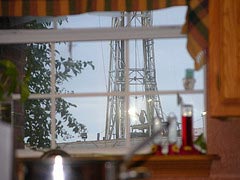
Beverly May and Terry Ratliff grew up like kin on opposite sides of a mountain ridge in eastern Kentucky. Now in their fifties, the two find themselves in the midst of a debate dividing their community and the world: who controls, consumes, and benefits from our planet's shrinking supply of natural resources?
While Beverly organizes her neighbors and leads a legal fight to stop Miller Brothers Coal Company from advancing into her hollow, Terry considers signing away the mining rights to his backyard-a decision that could destroy not only the two friends' homes, but the peace and environment surrounding their community.
Co-Director/Cinematographer
 JEN GILOMEN is Director of Public Media Strategies at the Bay Area Video Coalition (BAVC).
JEN GILOMEN is Director of Public Media Strategies at the Bay Area Video Coalition (BAVC).
Co-Director/Editor
See: Shnayerson, Michael. 2008. Coal River. 1st ed. Farrar, Straus and Giroux, January 8.
See: Robert F. Kennedy, Jr. Mobilizes on Mountaintop Removal
See: Marsh Fork Elementary: Journey Up Coal River | A Community and Strip Mining
See: Mountaintop Removal (Film)
See: Mike Roselle clip 2-from the Southern Regional Jail West Virginia
See: Tree spiker : from Earth First! to lowbagging: my struggles in radical environmental action
See: Leveling Appalachia: The Legacy of Mountaintop Removal Mining
Thomas Gold (1920-2004), Cornell astronomer and brilliant scientific gadfly.
The Abiogenic Theory of Petroleum Formation
Editor's Note: If we bust the myths about global warming and fossil fuels - the growing scarcity of our oil supply, and can replant lots of trees, by Freeman Dyson's estimates, a trillion, to remove all the carbon dioxide from the atmosphere now, with a lot more needed by 2050, as India, China, Brazil, etc. industrialize; then we only have to worry about methane from gas flares, and the melting of the tundra permafrost to prevent humanity from reaching the "tipping-point" of our destruction.
The Earth will undoubtedly survive, but we won't. Global Warming must be addressed by all governments, NGO's, citizen activists, and corporations. Drilling Isn't Safe. (Neil Zusman, 2010-11-14.)
Deep within the earth's crust there exists a second biosphere, composed of very primitive heat-loving bacteria and containing perhaps more living matter than is present on the earth's surface...
...Gold joins the deep hot biosphere argument to another, perhaps even more controversial theory for which he has marshalled evidence: that so-called fossil fuels originate not from compressed biological matter at all but from deep within the earth, present there since the planet's formation, long before our oxygen-rich surface biosphere came into existence.
The pattern of petroleum deposits and the mix of elements associated with them around the world, the dramatic results of a Swedish drilling project (1990) in non-sedimentary rock, and indications that some petroleum reserves are refilling - this is some of the evidence that supports Gold's thesis and cannot be adequately accounted for by conventional theories.
The implications of Gold's views are no less far-reaching than the theories behind them. The deep hot biosphere and deep-earth gas theories shed light on the nature of earthquakes, they suggest that reservoirs of petroleum and certain metal ores are much vaster (though not necessarily more accessible) than generally claimed, and they help to answer two of the most profound mysteries of the biological sciences: the origins of life on earth and the prospects of extraterrestrial life.
Did life develop from the deep hot biosphere? Are Mars and other planets as lifeless as they seem, or might they too be found to contain deep hot biospheres, if only scientists would look below the surface. --from the book jacket, 1999 edition.
Chapter 4. Evidence for Deep-Earth Gas
Chapter 5. Resolving the Petroleum Paradox
Chapter 6. The Siljan Experiment
Schematic image showing how the deep-earth gas theory would account for the helium association with methane (p. 76). Perhaps drilling deeper would make hydraulic fracturing and mountain-top removal unnecessary.
Gold's book has a Foreword by Freeman Dyson who is among the signatories of a letter to the UN criticizing the IPCC. He has argued against the ostracization of scientists whose views depart from the acknowledged mainstream of scientific opinion on climate change, stating that "heretics" have historically been an important force in driving scientific progress."
Heretics who question the dogmas are needed... I am proud to be a heretic. The world always needs heretics to challenge the prevailing orthodoxies."
See: Nicholas Davidoff. NYT. 2009. "The Civil Heretic".
See: Freeman Dyson. Heretical Thoughts About Science and Society. Edge | The Third Culture. Aug. 8, 2007.
See: Kellesidis, V.C. (2009). Challenges for very deep oil and gas drilling-will there ever be a depth limit? Athens, Greece: 3rd AMIREG International Conference (2009): Assessing the Footprint of Resource Utilization and Hazardous Waste Management.
Of course, we find oil ‘where it is’, where it has remained for ages, but how was it formed? Current belief is that oil is of biotic origin, through accumulation of organic matter (plankton, single cell organisms that floated on ocean surface) and sedimentation followed by burial. For large periods organic material has been under very high pressures and temperatures, in the range of 130-150 degrees C, in a ‘cooking pot’ and gradually transformed to petroleum.
Because of its lower density, it has migrated upwards and some surfaced and was lost, while some has hit non-permeable layers (the seal) and accumulated in the porous sedimentary rocks creating the world’s oil and gas fields.
There is, however, another school of thought, not very well known until recent years, which is gaining, though, momentum. It is the theory of abiotic (or abiogenic) origin of petroleum, that hydrocarbons have been formed in the depths of earth by reduction of CO2 and H2 gases in the presence of metal catalysts (Gold and Soter, 1980; Kenney, 1994; Krayushkin et al., 1994; Glasby, 2006; Wikipedia, 2009).
The consequences of course of such a theory, if true, could be extraordinary, as earth’s mantle becomes the inexhaustible provider of the cheapest energy source on earth...
Alexandrovich Kudryavtsev (Kudryavtsev, 1951) was the first to start the theory of abiotic generation of hydrocarbons, in what has become the modern Russian-Ukrainian theory of abyssal, abiotic petroleum (Kropotkin, 1986; Kenney et al., 2002). However, Abbas (1996) starts the history as early as 1877 by Mendeleev and provides a good overview as well as pros and cons about the two points of view.
See: Jet Propulsion Laboratory, California Institute of Technology. Beautiful Ontario Lacus: Cassini’s Guided Tour.
Ontario Lacus, the largest lake in the southern hemisphere of Saturn’s moon Titan, turns out to be a perfect exotic vacation spot, provided you can handle the frosty, subzero temperatures and enjoy soaking in liquid hydrocarbon.
See these articles:
Bluemle, J., and L. Manz. 2004. The Origin of Oil. North Dakota Department of Mineral Resources: North Dakota Feological Survey. NDGS Newsletter. 31: 1. Summer 2004.
Glasby, G. P. 2006. Abiogenic origin of hydrocarbons: An historical overview. Resource Geology 56, no. 1: 83–96.
Gold, Thomas. 1982. Abiogenic methane and the origin of petroleum. Energy Exploration & Exploitation 1, no. 2: 89–104.
———. 1992. The deep, hot biosphere. Proceedings of the National Academy of Sciences of the United States of America 89, no. 13: 6045.
———. 1993. The Origin of Methane (and Oil) in the Crust of the Earth. USGS Professional Paper 1570.
U.S. Department of the Interior | U.S. Geological Survey (USGS). 1998. OFR 98-468 World Conventional Crude Oil and Natural Gas. U.S. Geological Survey (USGS).










